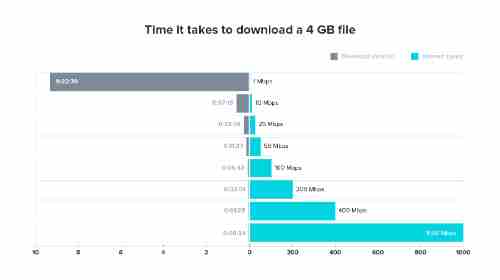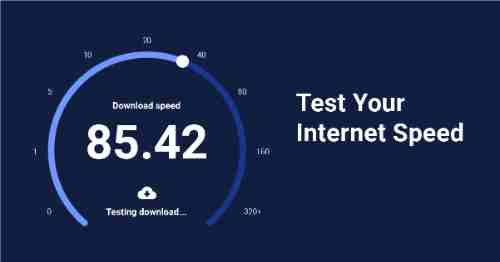In essence, if you reside in a house with a couple of others who use their email every day and enjoy streaming some TV shows, then 25Mbps is ideal for you. At a minimum of 100 Mbps, you are a household with more than one person who is learning and working from in the privacy of their home, using multiple devices, and performing other online-related things. The bigger your family and the number of heavy internet users, the more speed you’ll need.
Alongside price, Internet speeds are among the primary factors to consider in deciding on a plan for your internet and evaluating your current service. However, in contrast to the price, which allows you to examine the monthly costs and then say, “That fits my budget” or “That’s a new car payment,” the internet speed can be somewhat challenging.
What’s a great Internet speed?
As per the Federal Communications Commission (FCC), A good speed for internet is above or equal to 25 Mbps. The rates are sufficient for moderate internet activity, such as streaming, gaming online, surfing the web, and downloading music.

These standards were established in 2015, and the COVID-19 epidemic proved that these standards were insufficient for homes that were learning or working at home.
About two or three people can use 25 Mbps within the household. However, only one person at a time can play anything more, such as gaming or HD streaming any content.
A decent broadband speed can be much more than the 25Mbps limit, and the FCC suggested that rates of 100 Mbps are considered to be the minimal broadband. According to Ookla, the speed at which homes had internet access within the U.S. in October 2022 in fixed broadband was 182 Mbps for download and 22 Mbps for upload. This is significantly higher than the 25/3 threshold set by the FCC.
Good Internet speeds also benefit from low latency and high bandwidth. This allows information to be swiftly transferred within the set time frame.
What is the typical Internet speed?
According to the 2022 Allconnect report, the standard U.S. internet speed is 40 Mbps for upload. That represents an increase of 18% from year to year compared to 11 percent between 2020-2021.
Remember, “average” isn’t guaranteed the fastest or most efficient rate; it’s simply the speed internet users get within the U.S. during a specific time.
What Is a Good Internet Speed for General Use?
An internet connection’s speed depends almost exclusively on the task you plan to do. A high internet speed is ideal for conducting video-based meetings, streaming videos, online gaming, live streaming, and downloading large file sizes. If we make things too simple, most users with just one or two devices will only be able to experience speeds of up to 50 megabits (Mbps in shorter) in rate.
Download Speed vs Upload Speed
It’s crucial to remember that whenever we speak of “internet speed,” we’re actually putting two measures for upload and download speed.
For most internet users, download speed is the foremost factor. This is because most users receive more data than they transmit. Upload speed is essential for things like live streaming, online gaming, or video calls.
What Internet Speed Do I Need for Gaming?
Similar to streaming bandwidth, the bandwidth needed for online gaming depends on the game you’re participating in. Most games require the ping of your game is more crucial than an enormous quantity of bandwidth. However, competitive games that require quick reactions and low latency — like shooters — are likely to be the most affected due to poor internet connectivity.
Learn more about our latency vs speed and bandwidth vs data speed guides.
Regarding real-time data consumption, most games typically consume a maximum of a hundred megabytes an hour. In the case of most games, less than. In order to make sure there’s no delay, you’ll need at least 20Mbps of internet bandwidth on your computer and a ping that is at least 40ms. However, you’ll be OK with anything between 70 and 70 ms when the game isn’t dependent on quick and precise responses.
What speed of internet do I require? Tips for a quick fix

Netflix states that you need 5 Mbps to stream HD content, and the data rate is 25Mbps (megabits per second) to stream Ultra HD content. Ultra HD content. You’ll require more speed if you intend to connect several devices simultaneously. Similar is true for all other streaming platforms and game streaming, such as Twitch.
Multiple devices demand more bandwidth. If you intend to stream 4K video and have more than one device connected to the network, it is worth buying a plan with more speedy download speeds, like 200 Mbps. The rate is ideal well for households that are more dependent on data.
Consider the gigabit (1,000 milliseconds) speeds, if available. Users who consume significant data will likely require a higher rate and greater capacity. If they’re accessible in your area, gigabit-speed internet plans are among the most efficient you can find for your home connectivity right now, though certain ISPs are the rollout of multi-gig programs; however, they’re costly.
Be aware of your speed. It is one of the most effective speed testing apps to test your Internet connection speed to confirm that you’re receiving the rate you’re paying for.
Check your WiFi connection. The issue may not be due to the ISP; it’s with the home network. Check out our article for making WiFiWiFi faster with these simple tips, or think about changing your router.
There’s such a thing as too much speed.
Even though your ISP could advise you to sign up for a speedier and more costly plan, you could pay more than you should.
“To select the best services or package for your usage, you must understand your bandwidth needs,” stated Lincoln Lavoie, a senior engineer in broadband technology within the University of New Hampshire InterOperability Laboratory.

“This [bandwidth] depends more on the applications being used (streaming is largely a downstream application), but as users start doing more things like video calls and movie sharing, upload also becomes very important,” Lavoie said to Tom’s Guide.
“Similarly, upload speeds are critical for people working remotely from home, as upload speeds would impact things like screen sharing and online conference calls.”
Final Thoughts: Good Internet Speeds
We’ve finished our guide to upload and download speeds. Finding out the various internet providers’ services is challenging; understanding the bandwidth you’ll need is the first step towards unraveling the maze. If you’re fortunate enough to offer multiple broadband choices, go to our DSL comparison vs fiber comparison for additional details.
What do you think about our guidelines? Do you know what bandwidth you’ll need, but is the answer unclear? Did you need to upgrade your internet service in the past? How was it? Please share your experience via the comment section below. Thanks for taking the time to read.